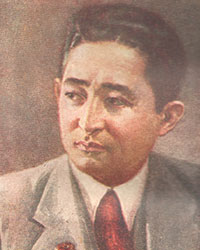SHARE WITH FRIENDS:
 Talented poet, playwright, scientist and public figure Hamid Olimjon was born on December 1909, 12 in Jizzakh. After graduating from the primary school named after Narimonov, he studied at the Samarkand Pedagogical College (1923-1926), then at the Pedagogical Academy (1926-1931). Hamid Olimjon was interested in poetry as a student. His works began to appear in the newspaper "Zarafshan" in 1926. In 1927, the poet moved to the editorial office of the newspaper.
Talented poet, playwright, scientist and public figure Hamid Olimjon was born on December 1909, 12 in Jizzakh. After graduating from the primary school named after Narimonov, he studied at the Samarkand Pedagogical College (1923-1926), then at the Pedagogical Academy (1926-1931). Hamid Olimjon was interested in poetry as a student. His works began to appear in the newspaper "Zarafshan" in 1926. In 1927, the poet moved to the editorial office of the newspaper.
Hamid Olimjon's first collection of poems "Koklam" was published in 1929. After that, collections of poems such as "Hair of Fire" (1931), "Death to the Wild" (1932), "Race" (1932) were published.
The poet, who kept pace with the times and described the heroism of our people in the field of labor, created the epic "Zaynab and Omon" in the 30s, along with a number of wonderful lyrical poems.
The lyrical hero of Hamid Olimjon's poetry is a man who keeps pace with the times, sings patriotic, songs of joy and happiness.
Corresponding member of the Academy of Sciences of Uzbekistan (1943) Hamid Olimjon created a number of scientific and critical works on topical issues of Uzbek literature.
Hamid Olimjon A. S. Pushkin, L. N. Tolstoy, M. Gorky, V. Mayakovskiy, A. Serafimovich, T. Shevchenko, M. Lermontov, N. Ostrovskiy, A. Korneychuk translated his works.
The epic "Alpomish", a masterpiece of Uzbek folklore, was first prepared for publication by Hamid Olimjon (1938). As a member of the jubilee committee for the 500th anniversary of Alisher Navoi, he conducted research on the life and work of the great poet.
From 1939 to the end of his life, Hamid Olimjon headed the Writers' Union of Uzbekistan.
Hamid Olimjon's collections "River Night" (1936), "Province" (1939), "Happiness" (1940), "The Story of Two Girls" (1935-1937), "Aigul and Bakhtiyor" (1937), "Semurg" (1939). ) with his epics contributed to the establishment of the principles of romantic imagery in Uzbek poetry.
During the fiery years of World War II, his poetic drama Muqanna was created, which is still one of the most beautiful examples of our dramaturgy. His drama “Crime” is written on a modern theme. During this period, along with several collections of his poems, a number of ballads such as "Warrior Tursun", "Tears of Roxana" were created.
The talented poet died in a car accident on July 1944, 3.